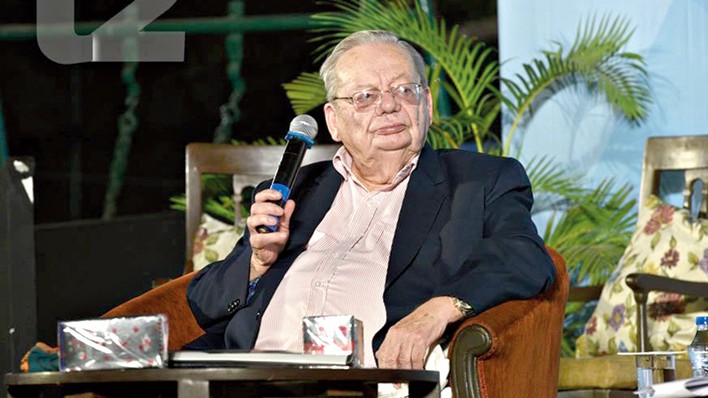Tata Steel Kolkata Literary Meet in association with The Telegraph celebrated Independence Day with a weekend special of four sessions with some well-loved authors and thought leaders throwing light on relevant topics like the state of healthcare around the world, Independence Day 1947 through the eyes of a 13-year-old, equestrian history from our Vedic texts and Indian revolutionary Udham Singh. Titled ‘Freedom Song’, the four illuminating sessions had authors Kunal Sarkar, Wendy Doniger, Ruskin Bond and Anita Anand. We tuned in...
Dr Kunal Sarkar on The Sickness of Health
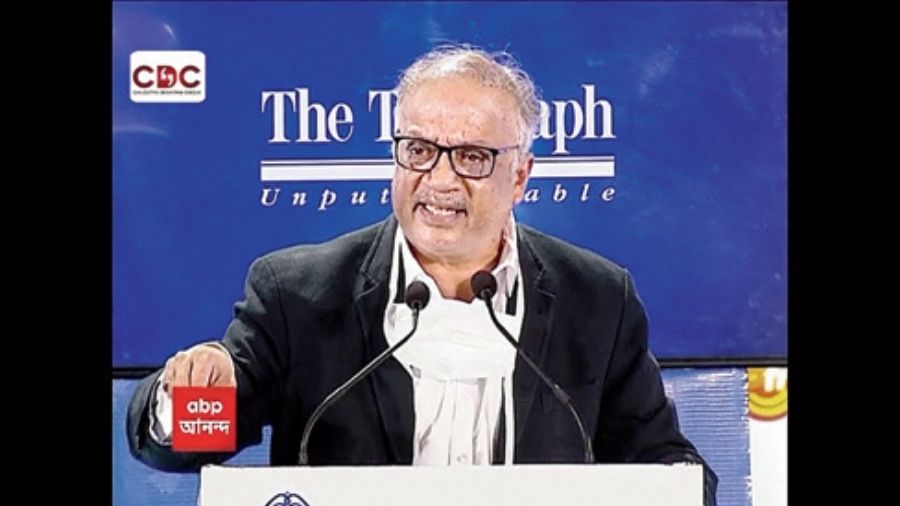
Kunal Sarkar talked with journalist Swati Bhattacharjee about his book that traces the history of healthcare in India Telegraph Picture
Kicking off the first session was cardiac surgeon and author Kunal Sarkar in conversation with journalist Swati Bhattacharjee, around a book that traces the history of healthcare in India ‘from colonial times to Covid times’ –– The Sickness of Health. Reading about the state of healthcare and being ‘provocated to think outside the box, outside the operation theatre, outside revenue streams and outside the mundane headaches’, led Sarkar to this book. He spoke of the immense influence of Dr Devi Shetty, whose extensive work in the healthcare system in India is unbeknownst to few. Sarkar admitted to the ‘beguiling emotion’ of being at the epicentre of an institution that is depended upon just as much as it is mistrusted –– the hospital.
Drawing historical references of stalwarts like Rabindranath Tagore and Mahatma Gandhi, who were skeptical of modern medicine for the longest time, he tries to understand the dichotomy of emotions in people in India. “Rabindranath greatly fancied himself as a doctor and most times he overdid it,” said Sarkar! Listening to Tagore’s ‘paanchon’ as it is known in Birbhum, which he dispensed to the public frequently, added to the incredulity of the informative and fun session! Bhattacharjee remembered Vidyasagar dabbling with homeopathy and administering them to the Santhals. “They all doubled as doctors,” laughingly added Sarkar! To know more about Tagore’s ‘paanchon for the pandemic’, his battle with prostate cancer, the privatisation of medical institutes of treatment post-Independence and the debilitating faith in modern medicine that continues till this day, catch the invigorating session on the Kolkata Literary Meet YouTube page.
Wendy Doniger on Winged Stallions and Wicked Mares: Horses in Indian Myth and History
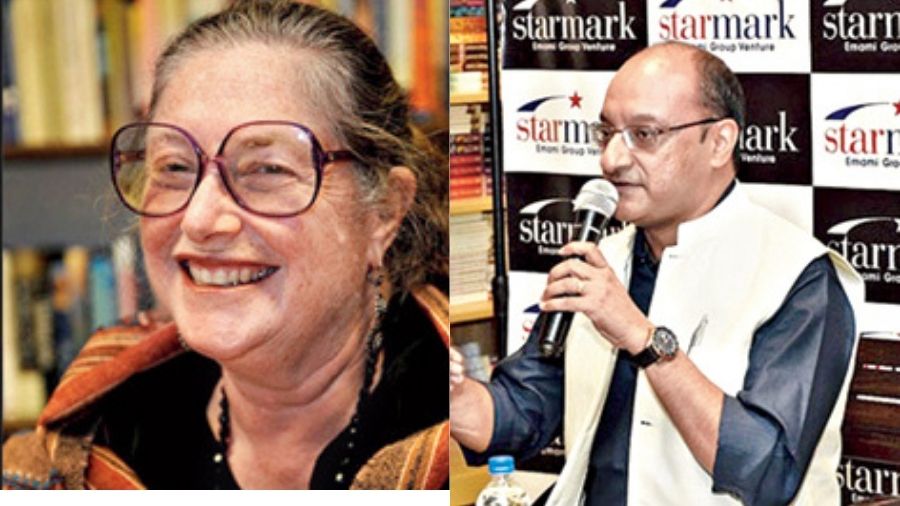
Indologist Wendy Doniger in conversation with author Avik Chanda Telegraph picture
The next session on August 14 had Indologist Wendy Doniger speaking about her book Winged Stallions and Wicked Mares: Horses in Indian Myth and History with author Avik Chanda. It was no surprise that the session began with a compulsory nod to an almost psychic connection the author shares with horses, which finds a way to the dedication in the book which goes far beyond the ‘the love of a mythologist and historian’. So how did this love shape the writing of the book, asked Chanda. “Well, it made me write the book!” Doniger began. She remembered the texts emerging from India where the authors evidently never owned horses to be writing about them. The equestrian understanding found lacking so, could perhaps be owed to the seasonal changes in India that discouraged their rearing and mostly related to the privileged class. “When you read the Rig Veda or the Mahabharata, you immediately know these are people who know about horses. The way they describe them and bring out an aspect that comes from deep understanding,” she said.
Horse sacrifice and its segue into different kinds of variations over time was another topic that Chanda asked Doniger about. She traces the sacrifices to the pre-Vedic time with probable Indo-European connections, “with sacrifices to Poseidon in Greek mythology”. “In the Vedic texts, horse sacrifice was something that gave political power to the king, along with the power of fertility,” she added. The politics of horse-rearing over the times was beautifully illuminated in this session by Doniger, a woman of vast and deep knowledge of not just horses but the Indian subcontinent and its rituals. Chanda’s thoughtful reading of her book and subsequent questions proved to be an added bonus for a book that is unique in its proposition.
Ruskin Bond on his memories of Independence Day
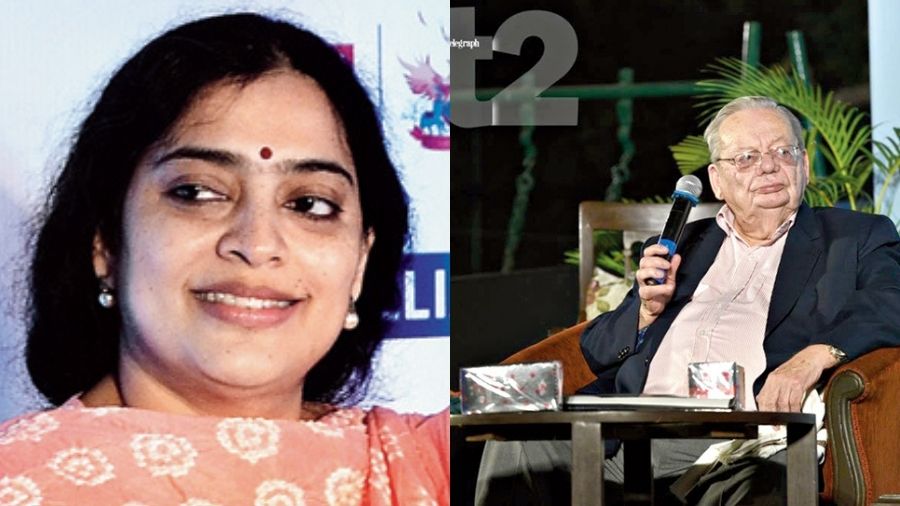
Malavika Banerjee, director of Kalam, interviewed Ruskin Bond Telegraph Picture
Kalam joined hands with British Council to bring forth this session with Ruskin Bond who spoke about his memories of August 15, 1947 and the building of a young nation’s independent journey. He was in conversation with Malavika Banerjee, director of Kalam. Remembering the day when Bond was a 13-year-old, he was ‘putting on his mackintosh and gumboots’ because as a student of Bishop Cotton School in Shimla, they were being marched up to the mall for flag-hoisting, he remembers with a chuckle. He also remembers the wonderful array of sweets that were served to them to celebrate the momentous day!
Those were the ‘radio days’ as Banerjee reminded Bond of their influence. From cricket commentaries to Nehru’s speech the next day, Bond reminisced those days with his favourite radio host Melville de Mellow. Some of Bond’s old stories in the 1950s were even broadcast on the radio, which has now shifted to an audiobook platform. “When I was a boy in London, somehow I got invited by the BBC to talk about growing up in India. I had a very Indian accent as I still do and the lady there tried really hard to brush up my accent. The radio played a very important role in my early writing career,” he said. Bond has recorded many of his stories for audiobook platforms and spoke about enjoying the idea of it despite never having heard them himself. “I tend to sleep off when my own voice is played to me! I recorded my audiobooks on the landline. There was no technology involved on my part for these readings,” he said. There is never a dearth of fun trivia and anecdotes from a session with Ruskin Bond –– ‘the chronicler of the last 75 years of freedom’ as Banerjee rightly called him, and this session was no different! Catch it on YouTube where it’s available on Kalam’s page.
Anita Anand on The Patient Assassin
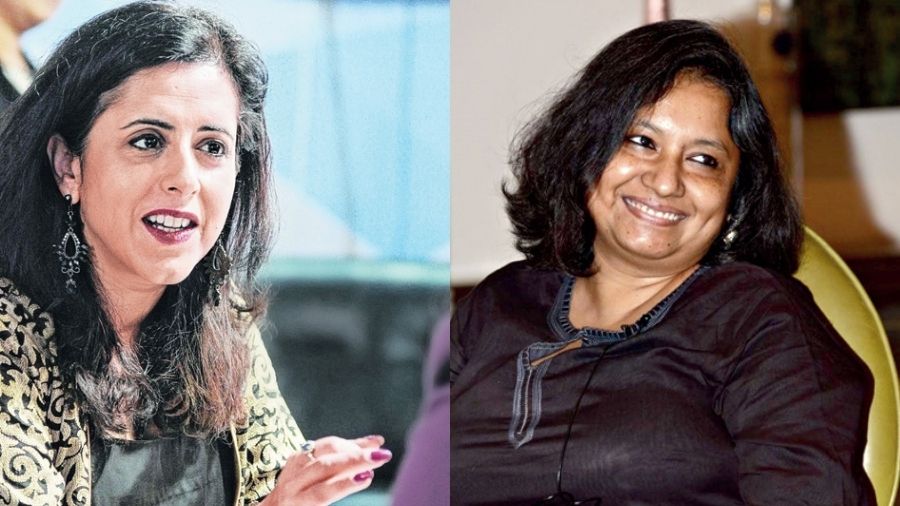
Anita Anand in conversation with author and editor Himanjali Sankar
As Debanjan Chakrabarti, director British Council East and North-East India, rightly stated at the beginning of the session, the complex history of the UK and India comes alive seamlessly in Anita Anand’s deeply researched and nuanced books that include the likes of Sophia: Princess, Suffragette, Revolutionary, Kohinoor: The Story of the World’s Most Infamous Diamond and The Patient Assassin: A True Tale of Massacre, Revenge and the Raj. In conversation with Anita Anand was Himanjali Sankar, an author and editor with Simon and Schuster. Hailed as a ‘non-fiction thriller’ the gripping narrative of The Patient Assassin has perhaps rightfully categorised so despite no such genres actually existing in the literary world, pointed out Sankar while asking Anand about her writing process! “I go about my writing like I go about my journalism –– with the notion of a truth somewhere in a mess of little facts and snippets. So I built on every book that I have written, a little like a mosaic, not sure what it would look like at the end of the day,” admitted Anand.
Anand spoke of her sense of familiarity with Udham Singh, the revolutionary whose story of revenge is documented in the book. She recalls her grandfather’s presence at Jallianwala Bagh on the day of the massacre and managing to escape death by sheer luck. “So it has kind of been entwined in my DNA,” she said of her involvement with this event and the subsequent book. She speaks of not trusting the stories she’d grown up hearing till she decided to write this book. Listening to her talk about the journey of this book makes for a fascinating hour of history and intrigue.
